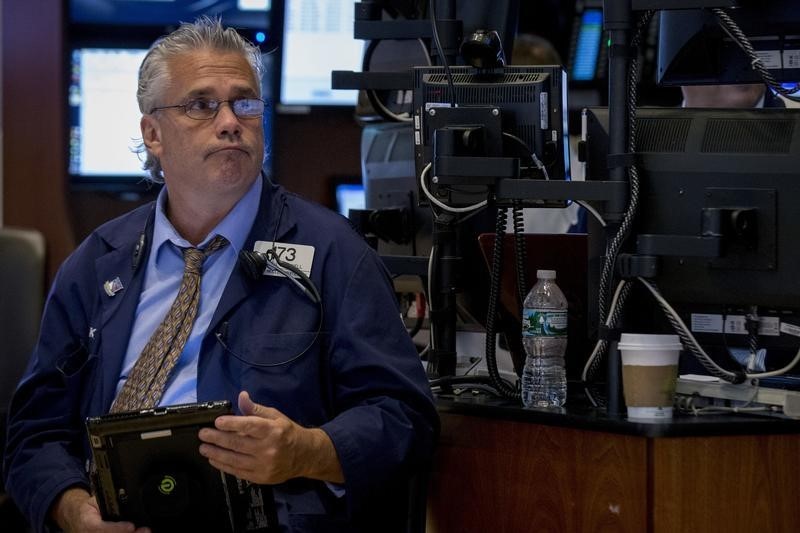By Benjamin Kang Lim and Samuel Shen
BEIJING/SHANGHAI (Reuters) - Chinese authorities have seized up to 1 trillion yuan ($157 billion) from local governments who failed to use their budget allocations, sources said, as Beijing looks for ways to spend its way out of an economic slowdown.
The exclusive Reuters report came after China's stocks fell following data suggesting economic growth was running below the 2015 target level of about 7 percent, heightening concerns about the health of the world's second largest economy.
"China's economy faces relatively big downward pressure, so investor sentiment remains weak," said Gu Yongtao, strategist at Cinda Securities.
Two sources close to the government said budget funds repossessed from local governments would be used to pay for other investments.
The huge underspend, linked to officials' reluctance to splash out on big-ticket projects while authorities crack down on corruption, supports the argument of some economists that Chinese state investment has grown too slowly this year.
"In the past, local governments had asked for the money. Money was given, but no one acted," said one of the two sources.
On Monday, China's powerful economic planner, the National Development and Reform Commission (NDRC), said it had approved feasibility studies for two road projects worth a total of 6.2 billion yuan ($973.65 million).
Last week, the NDRC gave the green light for railway, highway and bridge projects worth a combined $23 billion, in a sign authorities are focusing on infrastructure spending rather than deeper reforms to shore up growth in the short term.
MORE LOSSES FOR STOCKS
China's stock markets have been on a roller-coaster ride since June, falling close to 40 percent and prompting frantic efforts by authorities to restore confidence.
Still, at their peak this year, they were up more than 150 percent compared with the lows of 2014.
A surprise devaluation of the yuan in August further roiled markets, underlining concerns the economy was weaker than previously thought and forcing China to burn through its foreign exchange reserves to keep the currency stable.
A flurry of economic data in the past week has fed those concerns and prompted Premier Li Keqiang to try to reassure markets that China is on track to meet its main economic growth targets. The government has said it expects GDP growth of around 7 percent this year.
Price data pointed to increased deflationary pressure and lower-than-expected industrial output and investment figures this weekend raised further doubts.
"Overall, the economy is very weak and the central bank may have to continue cutting interest rates and banks' reserve requirement," said Zhou Hao, senior economist at Commerzbank AG (XETRA:CBKG) in Singapore, adding he thought growth would dip below 7 percent in the July-September quarter.
China's benchmark CSI300 index (CSI300) of the biggest listed stocks in Shanghai and Shenzhen closed down 1.97 percent, while the Shanghai Composite Index (SSEC) dropped 2.67 percent.
China CSI300 stock index futures fell, some by as much as 7 percent, underlining investor scepticism in the stock market's upside potential.
REFORMS TO 'ZOMBIE' COMPANIES
Government plans announced at the weekend on restructuring of state-owned enterprises (SOEs), including allowing private investment, appeared to offer little cheer for investors.
The mammoth task could involve some 25,000 enterprises owned and managed by local governments and more than 100 managed centrally under the State-owned Assets Supervision and Administration Commission, or SASAC.
"The plan has long been expected," said Cinda's Gu. "So interest toward the theme could be short-lived."
On Monday, Zhang Xiwu, deputy head of SASAC, told a news briefing that China would centralize state-owned capital in key industries, while restricting state investment in industries not in line with national policies.
"We will make more efforts in reforming 'zombie enterprises', long-time loss-making enterprises and in disposing of those low-efficient and non-performing assets," Zhang said.
The yuan erased some early losses following suspected intervention by the central bank via state-owned banks, traders said.
The currency
The price spread between the offshore and onshore yuan markets remained narrow, indicating overseas investors were heeding the indirect warning delivered by China last week, when state-owned banks, appearing to act on behest of the central bank, massively bid up the yuan in offshore markets in London and Hong Kong.
The offshore market continues to price in a slight discount however, suggesting expectations persist that the yuan will fall.
Reuters calculations based on central bank data released on Monday showed that China sold a record net 723.8 billion yuan ($113.69 billion) in August, showing the price the country is paying to keep its currency from falling.

"It also shows that the central bank will continue to intervene in the FX market in the coming months as depreciation expectation is still there," said Shen Jianguang, an economist at Mizuho Securities in Hong Kong.